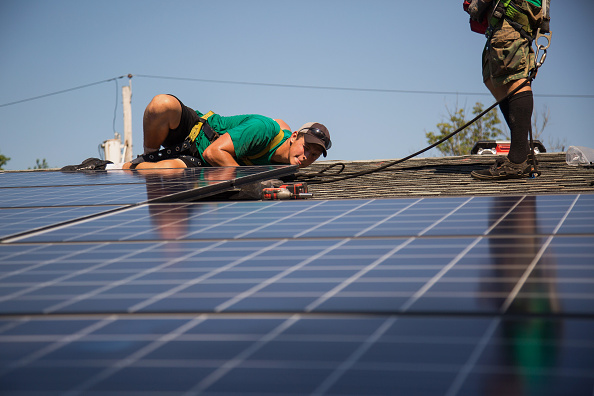
Critics of President Obama’s plan to reduce greenhouse gas emissions in the U.S. energy sector have asserted for more than a year that the plan will do more harm than good, costing homeowners and businesses by slashing jobs and driving up prices.
But researchers at the Georgia Institute of Technology have concluded that the Clean Power Plan will actually lower electricity bills.
In a report released last week, public policy professor Marilyn Brown found that boosting renewable energy sources such as wind and solar power would reduce energy costs in the long run as they become more readily available.
Even if energy costs did go up in the short run, she argued that would cause consumers to invest more in things like energy-efficient appliances, which would again lead to lower electricity bills over time.
“The idea that customer electricity bills may actually go down may seem counterintuitive to some, but it’s a natural outcome of making smart investments in energy efficiency — better heating and cooling equipment, programmable thermostats, appliances, replacing incandescent bulbs, using cogeneration, as well as insulation and windows,” said Brown in an email to TIME. “These investments can all produce lower electricity bills.”
Not everyone buys that analysis, however.
Nicolas Loris, a senior policy analyst at the Heritage Foundation, said that there’s nothing stopping consumers from buying energy-efficient appliances now, so that can’t be a reason for arguing the plan would reduce costs.
“Families and businesses already have the option to buy more energy efficient goods,” he said. “This logic is like a business telling an employee they’re getting a pay cut but to save money they can shop at Target. The option to shop at Target exists without the pay cut.”
But Brown says that people need to take the long view of the energy market.
“As energy is used more efficiently, non-competitive power plants can be retired, construction of new coal plants can be deferred and transmission and distribution line upgrades can be delayed,” says Brown. “All of which would lower rates and further lower the energy bills of Americans.”
More Must-Reads from TIME
- Why Biden Dropped Out
- Ukraine’s Plan to Survive Trump
- The Rise of a New Kind of Parenting Guru
- The Chaos and Commotion of the RNC in Photos
- Why We All Have a Stake in Twisters’ Success
- 8 Eating Habits That Actually Improve Your Sleep
- Welcome to the Noah Lyles Olympics
- Get Our Paris Olympics Newsletter in Your Inbox
Contact us at letters@time.com